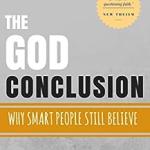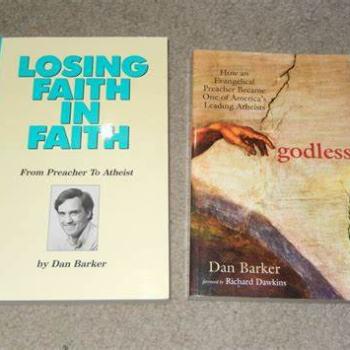
Philip Vander Elst is a freelance writer and lecturer who works primarily in the fields of politics and journalism.
Growing up in an unbelieving family, Elst was given to believe that religion was passé. He was convinced that religion existed to enslave believers to a kind of blind, unthinking devotion; and that science had essentially discredited all religions.
Since Elst was a strong believer in human rights and freedom, he was consequently opposed to the oppression he saw in religious belief.
As Elst grew to adolescence and then adulthood, he became more and more hostile toward religion; influenced by atheist/humanist philosophers and the academic environment of his school, Oxford University.
When Elst began to date a girl who was a Christian, he took upon himself the challenge of looking at the evidence for God.
Elst’s first stop was to look at the writings of C.S. Lewis. Being that Lewis had been an Oxford academic and former atheist, Elst felt that he was probably not prone to blind, unthinking belief. More importantly, Elst knew that Lewis had struggled deeply with the problem of evil and suffering in the world – the primary argument Elst had against God’s existence.
To his surprise, Elst found Lewis’ writings thoughtful, insightful, and containing the ring of truth; particularly in addressing the suffering and evil in the world. Says Elst:
“Since my own father had died when I was only 17, I found what Lewis had to say about the problem of evil particularly pertinent. As he rightly points out, we cannot complain about the existence of evil and suffering, and use that as an argument against the existence and goodness of God, unless we first believe that the standard of right and wrong by which we judge and condemn our world is an objective one. Our sense of justice and fairness has to be a true insight into reality, before we can we be justified in getting angry and indignant about all the pain and injustice we see around us. But if this is the case, what explains the existence within us of this inner moral code or compass? According to atheism, human beings and all their thinking processes are simply the accidental by-products of the mindless movement of atoms within an undesigned, random and purposeless universe. How then can we attach any ultimate meaning or truth to our thoughts and feelings, including our sense of justice? They have, on this view, no more validity or significance than the sound of the wind in the trees.”
Elst found Lewis’ representation of the origin and nature of evil in the world to be thoroughly sensible and explanatory:
“…what has really persuaded me of the truthfulness of the Christian explanation of the origin of evil and suffering, is its inherent philosophical credibility. As C.S. Lewis points out, true love is a voluntary union of free individuals giving themselves to each other for their mutual delight and for the mutual enjoyment of life and all its blessings. Consequently, when God created the first human beings, He gave them the gift of free will. He did so in order that they and all their descendants might share His life, His love, His joy and His beauty, with Him and with each other. As part of this gift of free will, God also gave human beings creativity and intelligence in order that they might be good stewards of the world in which he had placed them, sharing its joys and adding to its wonders and beauty. But the problem with free will is that it can be corrupted and misused. Our inner freedom to relate to God and other people in harmony and love, can be turned on its head. We can choose, instead, to reject our Creator and live only for ourselves. And that, sadly, is what has happened to the human race.”
C.S. Lewis went on to answer Elst’s objections to what he, Elst, saw as the unscientific nature of the Bible by pointing out that atheism rules out miracles a priori, when the existence of a God establishes natural (scientific) law, and also the grounds by which such laws may be over-ruled.
Convinced by his reading of Lewis that there may, in fact, be some grain of truth to Christianity, Elst turned to examining the texts themselves.
Far from the religious propaganda he had imagined them to be, Elst found the Gospels portrayed Jesus followers as flawed and foolish individuals who were astounded and stymied by their leader at every turn, abandoned him at the crucial hour of his arrest, and were absolutely unprepared for his resurrection, despite the fact that he had predicted it to them.
These same followers turned from frightened doubters to bold proclaimers who refused to abandon their faith or stop their preaching, even in the face of persecution and death.
Moreover, the body of Jesus was never recovered – either by the Jews or the Romans – in order to stifle the hated Christian sect.
As for the person of Jesus himself, Elst writes:
“The more I thought about all these points, the more convinced I became that the internal evidence for the reliability of the Gospels and the New Testament as a whole was overwhelming. Apart from any other consideration, the picture of Jesus they presented was so vivid and compelling. In its pages you see Him challenging the powerful, comforting the poor, exposing hypocrites, and healing the sick and the broken-hearted. He treats women as equals and shows tenderness to children. Even more strikingly, when Jesus speaks of His divine status (“He who has seen Me, has seen the Father”), He doesn’t convey any impression of madness or megalomania. Instead, His words seem to carry authority, and His enemies are never able to out-argue or outwit Him. In fact, they do not even deny the reality of His miracles, merely attributing them to sorcery! If God ever did come down into our world and live and walk among us as a human being, I thought, then surely Jesus was that Man.”
Elst also found that the external and manuscript evidence supporting the Jesus of the New Testament was plentiful.
At every turn, Elst’s research upheld rather than disproved the Christian claims. Finally, in 1976, this academic and atheist was persuaded to kneel and commit his life to Christ.
Elst continues to uphold and defend his hard-won beliefs in his work as a freelance writer and speaker in the UK.
His books include: Libertarianism: A Christian Critique and The Principles of British Foreign Policy.











